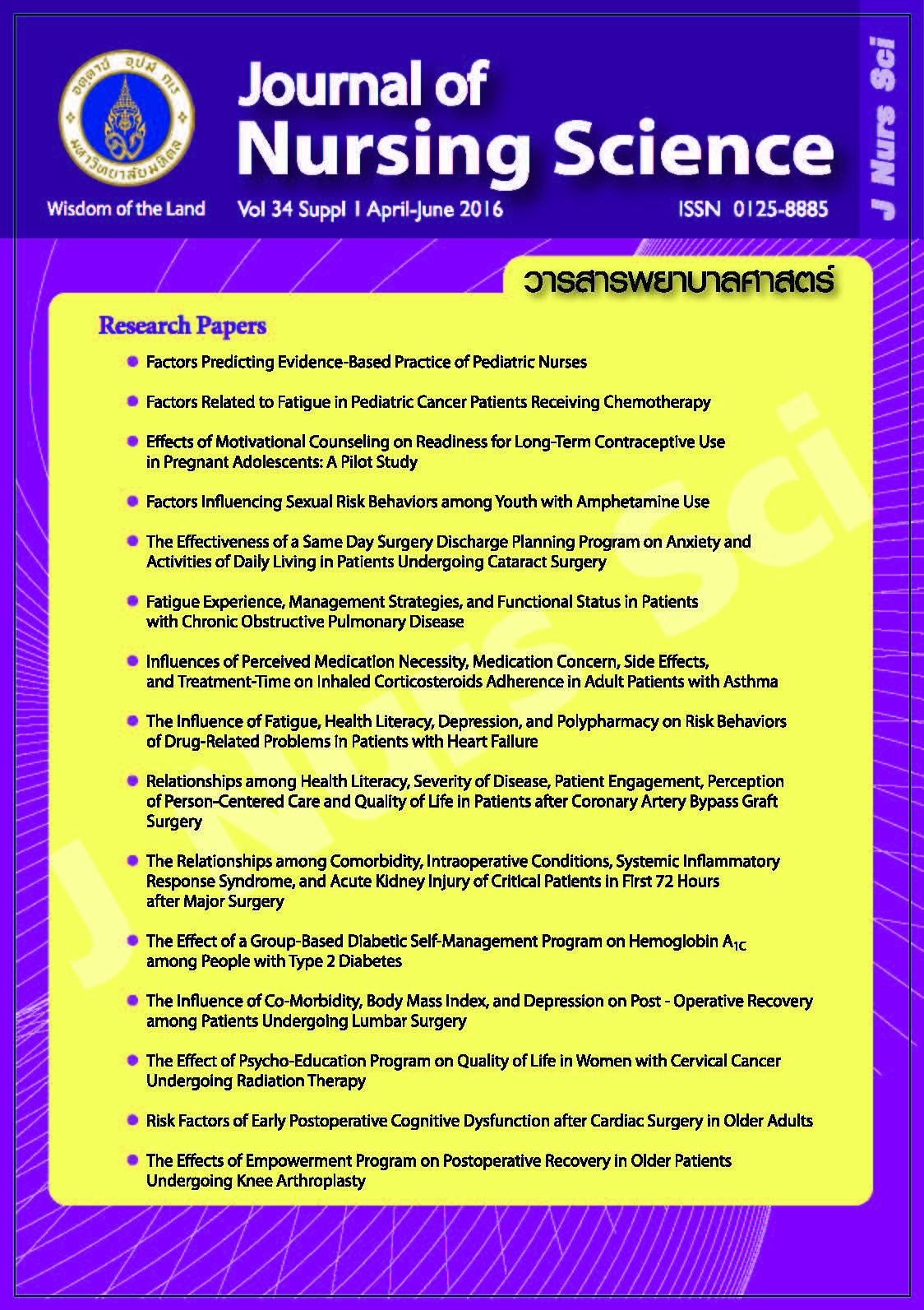The Influence of Fatigue, Health Literacy, Depression, and Polypharmacy on Risk Behaviors of Drug-Related Problems in Patients with Heart Failure
Main Article Content
Abstract
Abstract
Purpose: To study the influence of fatigue, health literacy, depression and polypharmacy on risk behaviors of drug-related problems in patients with heart failure.
Design: A correlational predictive design.
Methods: The sample consisted of 86 patients with heart failure at the out-patient department of Maharaj Nakorn Ratchasima Hospital. Data were collected using a demographic questionnaire; medications used record; Piper Fatigue Scale-12; Assessment of Functional Health Literacy for Patients with Heart Failure; Center for Epidemiologic Studies Depression Scale (CES-D); and Risk behaviors of drug-related problems. Data were analyzed using descriptive statistics, and multiple regressions.
Main findings: The results revealed that 62.8% of sample experienced moderate fatigue symptoms, 37.2% had adequate health literacy, 41.9% had depression, 51.2% used 3-6 medications (Max = 13, Min = 3, M = 6.78, SD = 2.72), and 62.8% had risk behaviors of drug-related problems. Fatigue, health literacy, depression and polypharmacy accounted for 15.3% of variance of risk behaviors of drug-related problems (R2 = .153, F = 3.667, p < .05). However, only depression had
statistical significance in predicting risk behaviors of drug-related problems (β = .416, p < .05).
Conclusion and recommendations: Nurses should pay attention on assessing depression and provide nursing care to reduce risk behaviors of drug-related problems in patients with heart failure.
อิทธิพลของอาการเหนื่อยล้า ความแตกฉานด้านสุขภาพ ภาวะซึมเศร้า และการใช้ยาหลายขนาน ต่อพฤติกรรมเสี่ยงของการเกิดปัญหาในการใช้ยาในผู้ป่วยภาวะหัวใจล้มเหลว
บทคัดย่อ
วัตถุประสงค์: เพื่อการศึกษาอำนาจการทำนายของอาการเหนื่อยล้า ความแตกฉานด้านสุขภาพ ภาวะซึมเศร้า และการใช้ยาหลายขนาน ต่อพฤติกรรมเสี่ยงของการเกิดปัญหาในการใช้ยาในผู้ป่วยภาวะหัวใจล้มเหลว
รูปแบบการวิจัย: การหาความสัมพันธ์เชิงทำนาย
วิธีดำเนินการวิจัย: กลุ่มตัวอย่างเป็นผู้ป่วยภาวะหัวใจล้มเหลวจำนวน 86 ราย ที่มารับการรักษาที่แผนกผู้ป่วยนอกโรงพยาบาลตติยภูมิแห่งหนึ่ง ในจังหวัดนครราชสีมา เก็บรวบรวมข้อมูลโดยใช้แบบสอบถามข้อมูลส่วนบุคคล แบบบันทึกการใช้ยาของผู้ป่วยภาวะหัวใจล้มเหลว แบบประเมินอาการเหนื่อยล้า แบบประเมินความแตกฉานด้านสุขภาพสำหรับผู้ป่วยที่มีภาวะหัวใจล้มเหลว แบบประเมินภาวะซึมเศร้า แบบประเมินพฤติกรรมเสี่ยงของการเกิดปัญหาในการใช้ยาใน
ผู้ป่วยภาวะหัวใจล้มเหลว วิเคราะห์ข้อมูลโดยใช้สถิติเชิงพรรณนา และการวิเคราะห์ถดถอยพหุคูณ
ผลการวิจัย: ผลลการศึกษาพบว่า กลุ่มตัวอย่างร้อยละ 62.8 มีประสบการณ์มีอาการเหนื่อยล้า ปานกลาง ร้อยละ 37.2 มีความแตกฉานด้านสุขภาพเพียงพอ ร้อยละ 41.9 มีภาวะซึมเศร้า ร้อยละ 51.20 ใช้ยา 3-6 ขนาน (Max = 13, Min = 3, M = 6.78, SD = 2.72) และร้อยละ 62.8 มีพฤติกรรมเสี่ยงของการเกิดปัญหาในการใช้ยา อาการเหนื่อยล้า ความแตกฉานด้านสุขภาพ ภาวะซึมเศร้า การใช้ยาหลายขนาน สามารถร่วมกันทำนายพฤติกรรมเสี่ยงของการเกิดปัญหาในการใช้ยาในผู้ป่วยภาวะหัวใจล้มเหลวได้ร้อยละ 15.3 (R2 = .153, F = 3.667, df = 4, p < .05) ภาวะซึมเศร้าเพียงปัจจัยเดียวสามารถพยากรณ์พฤติกรรมเสี่ยงของการเกิดปัญหาในการใช้ยาในผู็ป่วยภาวะหัวใจล้มเหลวได้อย่างมีนัยสำคัญทางสถิติ (β = .416, t = 3.769, p < .05)
สรุปและข้อเสนอแนะ: พยาบาลควรให้ความสนใจในการประเมินภาวะซึมเศร้าและให้การพยาบาล เพื่อลดพฤติกรรมเสี่ยงของการเกิดปัญหาในการใช้ยาในผู้ป่วยภาวะหัวใจล้มเหลว
คำสำคัญ: อาการเหนื่อยล้า ความแตกฉานด้านสุขภาพ ภาวะซึมเศร้า พฤติกรรมเสี่ยงของการเกิดปัญหาในการใช้ยา
Article Details
Copyright Notice: Nursing Science Journal of Thailand has exclusive rights to publish and distribute the manuscript and all contents therein. Without the journal’s permission, the dissemination of the manuscript in another journal or online, and the reproduction of the manuscript for non-educational purpose are prohibited.

Disclaimer: The opinion expressed and figures provided in this journal, NSJT, are the sole responsibility of the authors. The editorial board bears no responsibility in this regard.


